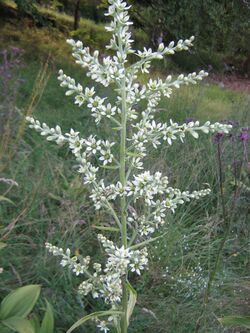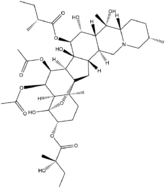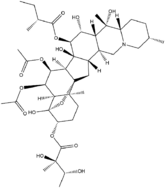Biology:Veratrum album
| Veratrum album | |
|---|---|

| |
| Scientific classification | |
| Kingdom: | Plantae |
| Clade: | Tracheophytes |
| Clade: | Angiosperms |
| Clade: | Monocots |
| Order: | Liliales |
| Family: | Melanthiaceae |
| Genus: | Veratrum |
| Species: | V. album
|
| Binomial name | |
| Veratrum album | |
Veratrum album, the false helleborine, white hellebore, European white hellebore, or white veratrum (syn. Veratrum lobelianum Bernh.)[1] is a poisonous plant in the family Melanthiaceae. It is native to Europe and parts of western Asia (western Siberia, Turkey, Caucasus).[2]
Description
Veratrum album is a tall herbaceous perennial plant with alternate, pleated leaves. The flowers are white, marked with green on the top portion of the stalk. The fruit is a small pod containing winged seeds. The stout, simple stems are 50–175 cm (20–69 in) tall. The plants have an estimated lifespan of several centuries and often achieve dominance in wild areas as they are unpalatable to grazing herbivores.[3]
Uses
Extracts from dried rhizomes of Veratrum album were briefly used as a pesticide against the Colorado potato beetle.[4]
Research
In 1890, Georg Salzberger first isolated and named the alkaloid protoveratrine.[5] Later investigation found that protoveratrine is a mixture of two closely related alkaloids, protoveratrine A and protoveratrine B.[6] During the 1940s and 1950s, Veratrum album was studied in essential hypertension, hypertension during renal dysfunction, and pre-eclampsia.[7][8]
Horticultural
Veratrum album is grown as an ornamental plant. In the UK It has gained the Royal Horticultural Society’s Award of Garden Merit.[9][10]
Toxicity
In beverages, V. album has been mistaken for the harmless yellow gentian (Gentiana lutea) or wild garlic (Allium ursinum), resulting in poisoning.[11][12][13] All parts of the plant are poisonous.[14]
Symptoms
Symptoms of Veratrum alkaloid poisoning typically occur within thirty minutes to four hours of ingestion,[15] and include:[16]
- vomiting
- abdominal pain
- hypotension
- bradycardia
- nausea
- drowsiness
- dizziness
- dilated pupils
Treatment
Treatment for Veratrum alkaloid poisoning include supportive care and symptomatic treatments, such as fluid replacement and anti-emetics. Atropine and vasopressors act to combat bradycardia and hypotension. Duration of illness can last up to ten days but full recovery is possible within a few hours depending on dose and treatment.[15]
Poisonings
Various Veratrum alkaloids were present in a German sneezing powder in 1982, resulting in the accidental poisoning of those who used it.[17] Sneezing powders are commonly used to prank others. In 1983, there were nine cases of accidental poisoning as a result of these pranks due to the presence of Veratrum alkaloids in the sneezing powders.[18] The victims were nine boys aged between 11 and 18 years old in Scandinavian countries who used supplies imported from the Germany . All boys had inhaled the powder and six had ingested it. Symptoms typically presented within an hour, after which calls were made to authorities. After sneezing, the victims began to develop gastrointestinal disturbances such as vomiting in all cases and epigastric pain in two. Three of the children collapsed due to low blood pressure prior to being admitted to hospital. Seven of the children had significantly decreased blood pressure and five have cases of sinus bradycardia with no other irregularities. Half of those who had ingested the powder were treated with gastric lavage. Four of the boys were given atropine to combat bradycardia and one was given activated charcoal. Atropine normalised their heart rates within minutes but did little to assist with low blood pressure. In all cases, the patients recovered within twenty-four hours.[17]
In 2005 and 2008, there were three reported cases of accidental poisoning.[12][11] In 2009, eleven children, aged 8 to 12 years old, accidentally ingested Veratrum album at a youth camp where they had prepared homemade tea using fresh herbs. Two children remained asymptomatic, nine developed mild gastrointestinal symptoms, six presented neurological symptoms, and three showed bradycardia; after medical care, all children recovered.[19] Four cases of accidental poisoning were reported in 2010 after Veratrum album was mistaken for wild garlic and used in self prepared-salad and soups.[13] All victims developed nausea, vomiting, abdominal pain, sinus bradycardia, and hypotension. Complete recovery took between twenty-four and forty-eight hours.
Alexander the Great
A debate amongst historians is centred around the cause of death of Alexander the Great. Some believe the Macedonian king died of natural causes and others believe he was poisoned. The Romance suggests that his inner circle conspired to assassinate him upon his return to Babylon.[20] A theory proposed by Schep in 2013 suggests that Veratrum album was used to kill Alexander the Great.[21] Schep argues that the usual suspects thought to be the culprit, such as arsenic and strychnine, would have acted too quickly to correlate with historical accounts. Alexander was ill for twelve days and suffered symptoms synonymous with Veratrum album poisoning. Notably, the theory is furthered by the proposal that Alexander drank wine poisoned with Veratrum album. Accounts from Diodorus detail that the king was struck with pain after drinking a large bowl of unmixed wine in honor of Hercules.[22]
In vitro mechanism
Veratrum album contains over fifty steroidal alkaloids called 'Veratrum alkaloids', including O-acetyljervine, cevadine, cryptenamine, cyclopamine (11-deoxojervine), cycloposine, germitrine, germidine, jervine, muldamine, protoveratrine (A&B), veratramine, veratridine, and veriloid.[23][24][25] Some of the principal toxins have a modified steroid template while others differ in their esterified acid moieties.[15] In general, Veratrum alkaloids act by increasing the permeability of the sodium channels of nerve cells, causing them to fire continuously. Increased stimulation, associated with the vagus nerve, results in the Bezold-Jarisch reflex: hypotension, bradycardia and apnoea.[15]
The neurotoxicity of Veratrum alkaloids derives from their effect on the sodium ion channels of nerve cells. They activate receptor site 2 of the voltage-dependent Na+ channel in membranes by prolonging its open state.[26] The alkaloids depolarize nerves by enhancing exchange of Na+ and K+ across the membrane.[27]
References
- ↑ "Pfaf Plant Search". http://www.pfaf.org/database/plants.php?Veratrum+album.
- ↑ "World Checklist of Selected Plant Families: Royal Botanic Gardens, Kew" (in en-GB). http://apps.kew.org/wcsp/namedetail.do?name_id=291244.
- ↑ Kleijn, David; Steinger, Thomas (April 2002). "Contrasting effects of grazing and hay cutting on the spatial and genetic population structure of Veratrum album, an unpalatable, long-lived, clonal plant species" (in en). Journal of Ecology 90 (2): 360–370. doi:10.1046/j.1365-2745.2001.00676.x. ISSN 0022-0477.
- ↑ Aydin, Tuba; Cakir, Ahmet; Kazaz, Cavit; Bayrak, Neslihan; Bayir, Yasin; Taşkesenligil, Yavuz (2014). "Insecticidal Metabolites from the Rhizomes ofVeratrum albumagainst Adults of Colorado Potato Beetle,Leptinotarsa decemlineata" (in en). Chemistry & Biodiversity 11 (8): 1192–1204. doi:10.1002/cbdv.201300407. ISSN 1612-1872. PMID 25146763.
- ↑ Stoll, A.; Seebeck, E. (1953). "Über Protoveratrin A und Protoveratrin B. 6. Mitteilung über Veratrum-Alkaloide" (in de). Helvetica Chimica Acta 36 (3): 718–723. doi:10.1002/hlca.19530360326. ISSN 0018-019X.
- ↑ Glen, WL; Myers, GS; Barber, R; Morozovitch, P; Grant, GA (1952). "Hypotensive Alkaloids of Veratrum album" (in En). Nature 170 (4335): 932. doi:10.1038/170932a0. ISSN 0028-0836. PMID 13013269. Bibcode: 1952Natur.170..932G.
- ↑ Barrow, J. G.; Sikes, C. R. (May 1951). "The use of purified veratrum viride alkaloids in the treatment of essential hypertension". American Heart Journal 41 (5): 742–748. doi:10.1016/0002-8703(51)90263-3. ISSN 0002-8703. PMID 14829406.
- ↑ Meilman, Edward; Krayer, Otto (1950-02-01). "Clinical Studies on Veratrum Alkaloids: I. The Action of Protoveratrine and Veratridine in Hypertension" (in en). Circulation 1 (2): 204–213. doi:10.1161/01.CIR.1.2.204. ISSN 0009-7322. PMID 15409589.
- ↑ "RHS Plantfinder - Veratrum album". https://www.rhs.org.uk/Plants/18784/i-Veratrum-album-i/Details.
- ↑ "AGM Plants - Ornamental". Royal Horticultural Society. July 2017. p. 106. https://www.rhs.org.uk/plants/pdfs/agm-lists/agm-ornamentals.pdf.
- ↑ 11.0 11.1 Grobosch, T.; Binscheck, T.; Martens, F.; Lampe, D. (November 2008). "Accidental intoxication with Veratrum album". Journal of Analytical Toxicology 32 (9): 768–773. doi:10.1093/jat/32.9.768. ISSN 0146-4760. PMID 19021933.
- ↑ 12.0 12.1 Zagler, Bernhard; Zelger, Anton; Salvatore, Carmen; Pechlaner, Christoph; De Giorgi, Franco; Wiedermann, Christian J. (February 2005). "Dietary poisoning with Veratrum album — a report of two cases". Wiener Klinische Wochenschrift 117 (3): 106–108. doi:10.1007/s00508-004-0291-x. ISSN 0043-5325. PMID 15773425.
- ↑ 13.0 13.1 Gilotta, Irene; Brvar, Miran (2010). "Accidental poisoning with Veratrum album mistaken for wild garlic (Allium ursinum)". Clinical Toxicology 48 (9): 949–952. doi:10.3109/15563650.2010.533675. ISSN 1556-3650. PMID 21171854.
- ↑ (in en-gb) Handbook of Poisonous and Injurious Plants. 2007. doi:10.1007/978-0-387-33817-0. ISBN 978-0-387-31268-2.
- ↑ 15.0 15.1 15.2 15.3 Schep, Leo J.; Schmierer, David M.; Fountain, John S. (2006-06-01). "Veratrum Poisoning" (in en). Toxicological Reviews 25 (2): 73–78. doi:10.2165/00139709-200625020-00001. ISSN 1176-2551. PMID 16958554.
- ↑ "Veratrum album, white hellebore". The Poison Garden. http://www.thepoisongarden.co.uk/atoz/veratrum_album.htm.
- ↑ 17.0 17.1 Carlier, P.; Efthymiou, M-L.; Garnier, R.; Hoffelt, J.; Fournier, E. (April 1983). "Poisoning with Veratrum-containing Sneezing Powders". Human & Experimental Toxicology 2 (2): 321–325. doi:10.1177/096032718300200224. PMID 6862477.
- ↑ Fogh, Anne; Kulling, Per; Wickstrom, Elsa (1983). "Veratrum Alkaloids in Sneezing-Powder a Potential Danger". Journal of Toxicology: Clinical Toxicology 20 (2): 175–179. doi:10.3109/15563658308990062. PMID 6887310.
- ↑ Rauber-Luthy, Christine (February 2010). "Low-dose exposure to Veratrum album in children causes mild effects – a case series". Clinical Toxicology 48 (3): 234–7. doi:10.3109/15563650903575243. PMID 20170391.
- ↑ Pseudo-Callisthenes. (1991). The Greek Alexander romance. Stoneman, Richard.. London, England: Penguin Books. ISBN 978-0140445602. OCLC 24810739. https://archive.org/details/greekalexanderro00pseu.
- ↑ Schep, Leo (August 2013). "Was the death of Alexander the Great due to poisoning? Was it Veratrum album?". Clinical Toxicology 54 (1): 72–77. doi:10.3109/15563650.2013.870341. PMID 24369045.
- ↑ "Mystery of Alexander the Great's death solved? Ruler was 'killed by" (in en-GB). The Independent. 2014-01-12. https://www.independent.co.uk/news/science/mystery-of-alexander-the-greats-death-solved-ruler-was-killed-by-toxic-wine-claim-scientists-9054625.html.
- ↑ Chen, K. K.; Henderson, F. G.; Anderson, R. C. (August 1950). "The cardiac action of Helleborus glycosides and their aglycones". The Journal of Pharmacology and Experimental Therapeutics 99 (4): 325–400. ISSN 0022-3565. PMID 15437315.
- ↑ Freis, E. D.; Stanton, J. R.; Moister, F. C. (February 1950). "Assay in man of the chemical fractions of Veratrum Viride, and identification of the pure alkaloids germitrine and germidine as potent hypotensive principles derived from the drug". The Journal of Pharmacology and Experimental Therapeutics 98 (2): 166–173. ISSN 0022-3565. PMID 15422510.
- ↑ Marchetti, G. (January 1954). "[Effect of two new alkaloids of Veratrum viride on the circulatory apparatus]". Archivio Italiano di Scienze Farmacologiche 4 (1): 15–27. PMID 13159580.
- ↑ Ujvary, Istvan; Eya, Bryan K.; Grendell, Richard L.; Toia, Robert F.; Casida, John E. (October 1991). "Insecticidal activity of various 3-acyl and other derivatives of veracevine relative to the veratrum alkaloids veratridine and cevadine" (in en). Journal of Agricultural and Food Chemistry 39 (10): 1875–1881. doi:10.1021/jf00010a039. ISSN 0021-8561.
- ↑ Papahadjopoulos, D. (1972-04-18). "Studies on the mechanism of action of local anesthetics with phospholipid model membranes" (in en). Biochimica et Biophysica Acta (BBA) - Reviews on Biomembranes 265 (2): 169–186. doi:10.1016/0304-4157(72)90001-9. ISSN 0304-4157. PMID 4555469.
External links
Wikidata ☰ Q157547 entry
 |




